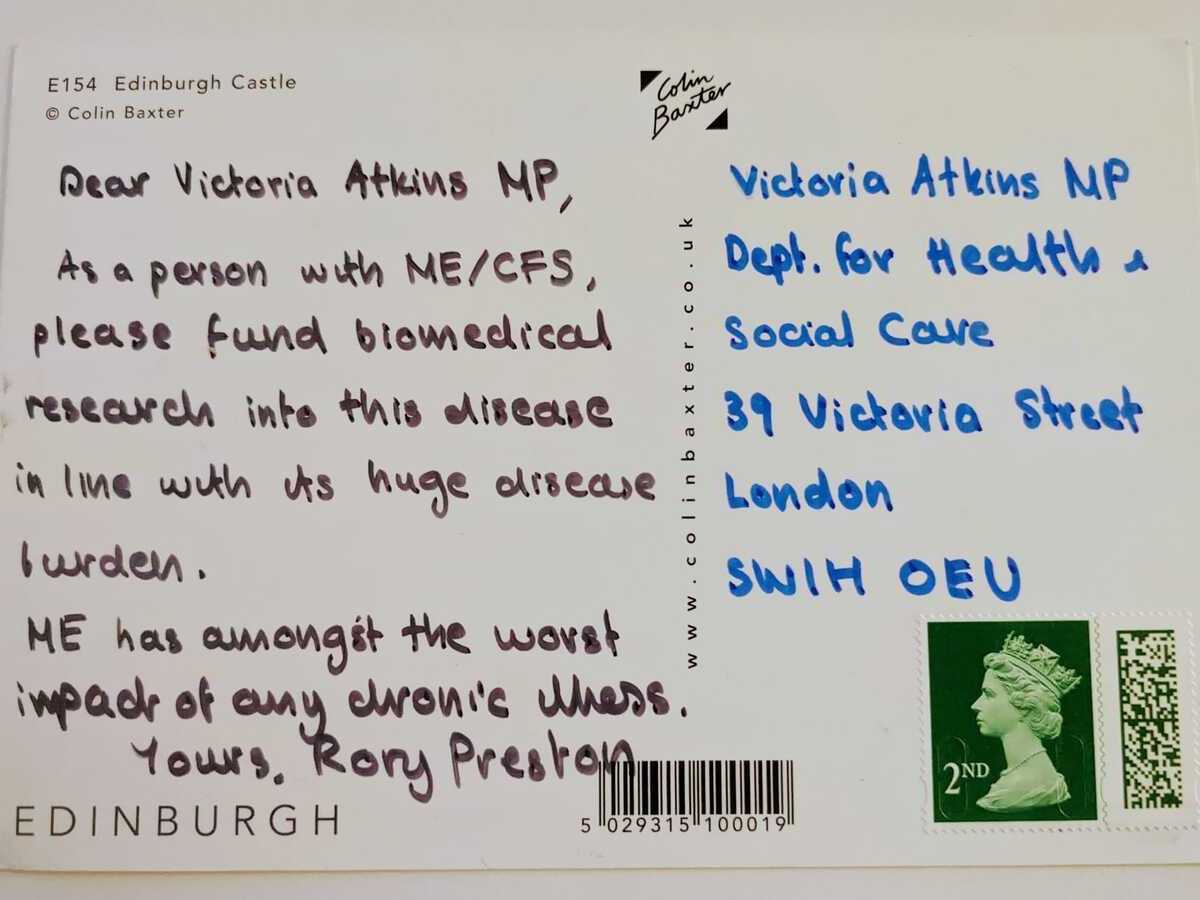A new campaign seeks to shake up the dire state of funding for biomedical research into myalgic encephalomyelitis (ME). In time for ME Awareness Day on 12 May, a volunteer group is launching a new postcard project.
Crucially, this will call funding parity for biomedical studies of the appallingly under-researched disease. Of course, it’s calling for support from inside the ME community and beyond to make this a reality.
ME/CFS research funding abysmally low
There are claims that 250,000 people in the UK currently live with ME. This is almost certainly a huge underestimate. On top of this, new ONS data has calculated at least two million people are also living with long Covid. Again, as the Canary pointed out, this is lower than the actual number of people with the post-viral illness. Crucially, studies have shown already that over 50% of people living with long Covid meet the diagnostic criteria for ME.
ME is a horrifically disabling chronic illness with a range of debilitating symptoms that impact the day-to-day lives of patients. You can read more on these here. And right now, as the Canary has consistently reported, NHS hospitals are abusing two women living with it in its severest form.
Given the huge numbers of people living with this awful post-viral illness, you’d think there’d be no shortage of funds pouring in to crack its biophysiological causes. Unfortunately, this is far from the case.
As the Canary’s Steve Topple highlighted in 2018, research funding for ME is woefully short of what’s needed. At the time, the NHS and medical charities had ploughed less than £2.3m between the financial years for 2014 to 2017.
Notably, this paled in comparison to the spend on other health conditions. Moreover, up against the economic disease burden – the cost to the UK economy – the funding for it fell shockingly short. As he detailed:
funding per patient, per year for MS was £82.20 versus an economic disease burden of £20,000. For people living with ME, it was £4.40 versus £13,200 respectively. It is deeply unpleasant to have to compare people’s different disabilities like this. But it is important to understand the lack of research into ME.
Biomedical research delayed by junk science
Predictably then, over half a decade on and situation isn’t looking much better. In a November 2023 response to a written question to the Department of Health and Social Care (DHSC), health minister Andrew Stephenson gave the figures for ME research funding.
He told parliament that through the National Institute for Health and Care Research (NIHR), the government had funded it to the tune of just £4.4m. As well as this, he said that the NIHR and Medical Research Council (MRC) had funded DecodeME – a groundbreaking genetics study – with £3.2m.
The NIHR put £1.4m towards this. However, Stephenson did not confirm if this was additional to the £4.4m government figure. This figure did not appear to include funding from all medical research charities as the 2018 one had. Nevertheless, it demonstrated government investment into ME research has stayed shamefully low.
Of course, this isn’t even to mention that the government and organisations have ploughed the bulk of this funding into junk science on psychological treatments. In May 2022, the All-Party Parliamentary Group (APPG) on Myalgic Encephalomyelitis in a report said that the delay in biomedical research had been:
compounded by the unnecessary emphasis on a small number of flawed but influential studies, such as the Pacing, Graded Activity, and Cognitive Behaviour Therapy; a Randomised Evaluation (PACE) Trial, which sought to confirm a psychological cause of ME and a beneficial effect for behavioural forms of treatment, such as GET
Now, one group is saying that enough is enough.
Time for “fair funding” into biomedical research
CrunchME is a volunteer project seeking to challenge the research stagnation for ME. As its website expresses, it aims to:
accelerate progress towards treatments and cures.
It plans to do this by:
mapping out the research, clinical, tech, and advocacy ecosystem around ME/CFS, Long Covid, and other infection-associated chronic conditions (IACCs)
Currently, five volunteers – most living with ME or long Covid themselves – are coordinating the project.
On 24 April, founder of CrunchME and data scientist Rory Preston announced the group’s new postcard campaign on X for ME Awareness Day:
Returning to UK #MECFS 🇬🇧👀
Our #DearMinister postcard campaign is upcoming for #MEAwarenessDay ✉️
But if you use Moonpig, you can write it *today* & have it delivered on 12th May!
Template & addresses to send to here 👇https://t.co/FZFgZDlNV4
— Ror Preston (@RorPreston) April 24, 2024
As the campaign webpage explains, the project calls for people to send postcards or letters to:
key UK government ministers in charge of departments related to biomedical research funding, calling for fair funding for biomedical ME/CFS research!
Targets include the likes of current health secretary Victoria Atkins and the secretary of state of Science, Innovation & Technology Michelle Donelan. Of course, it also puts Labour’s shadow cabinet in the firing line – including health secretary Wes Streeting.
CrunchME want to make the fight for more research funding accessible to people living with ME and long Covid. Hence, the project provides people with template text, alongside artwork to generate a postcard using Moonpig. You can take part in the campaign here.
ME’s medical research moonshot for ME Awareness Day
Preston told the Canary that the current hospital abuse of Carla and Millie had spurred the campaign.
Specifically, he explained that the ME community’s response to Millie’s situation had inspired the group to spring into action. In particular, he referenced the community organised card campaign in support of Millie and her family.
With this, hundreds of people living with ME and allies have sent cards to Millie in hospital:
Millie has received so many cards over the few weeks, most of these from fellow ME suffers.
The amount of people with ME is massive and only growing, it’s extremely disappointing that more research, funding and education isn’t being done to address this. #ME #MilliesevereME #NHS pic.twitter.com/W3OEObaiqU
— Etta Loveday (@EttaLovedayME) March 24, 2024
Partly, the idea was that the cards would remind medical staff that the community were watching. In other words, it sought to put pressure on the hospital to finally listen to Millie and her family – and importantly, stop the abuse.
Alongside Millie’s card campaign, Preston said that the successful public engagement of the Long Covid Moonshot project in the US compelled the group to set this new ME Awareness Day campaign in motion.
There, the organisation has galvanised people across the country to call or write to their representatives over the dearth of funding for long Covid research. In particular, Long Covid Moonshot is demanding more federal funding – at least US $1bn annually – into biomedical research for the similarly neglected post-viral illness.
ME community taking action for ME Awareness Day
Significantly, Preston told the Canary that inaction from the UK’s ME charities on this compelled him to step up. In particular, he articulated his frustration at:
the lack of organisation via social media to reach out to politicians etc by the large ME orgs
So once again, it has taken people living with ME to take action on this pressing need for biomedical research. Preston and CrunchME understand that the real power to bring about change for people living with the devastating disease lies in the community.
Vitally, its campaign aims to empower people living with ME in an accessible way. Moreover, it hopes to rally allies across social media to come out in support.
With a general election imminent, now’s the time to call on the two major parties to act. Proper funding into medical research for ME can’t come soon enough.
Feature image via Ror Preston




